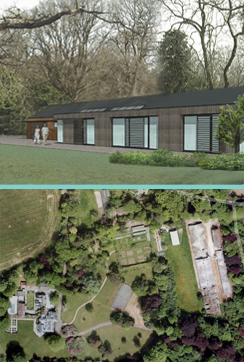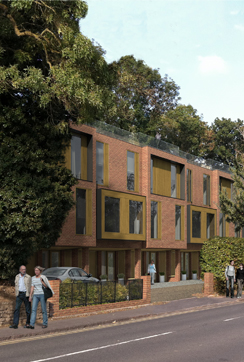Introduction
Advoco Planning provides a comprehensive planning service for a wide range of development types and proposals. We aim to provide realistic, practical and honest planning advice.
ADVOCO PLANNING
14 OAK HILL
ALRESFORD
HAMPSHIRE
SO24 9LB
+44 (0)1962 736201
MAIL@ADVOCOPLANNING.CO.UK
Advoco Planning provides a comprehensive planning service for a wide range of development types and proposals. We aim to provide realistic, practical and honest planning advice.
Advoco Plannig provide the following comprehensive planning services:
The negotiation, submission and project management of all types of planning applications ranging from small domestic proposals through to major residential, commercial and infrastructure projects.
Planning appraisals of sites to establish development potential.
Negotiation (and re-negotiation) of s.106 planning obligations.
Submission and project management of planning appeals.
Direct Professional Access for Public Inquiry appeals.
Project management of major planning applications including co-ordinating inputs from a project team comprising a range of specialists to suit the project requirements.
Promotion of sites for future development via the Local Development Framework system.
Representations to Local Planning Authorities in response to planning policy consultation documents Planning Enforcement matters.
Submission of lawful development certificates.
Developments involving Conservation Areas, Listed Buildings and Heritage Assets.
Advising on rural planning matters including agricultural diversification and equestrian related proposals.
Site finding and selection advice.
Advice on sustainable development and renewable energy.
Help for self-build projects.
Advoco is Latin for the need to call in an advisor. Advoco Planning therefore makes perfect sense in every sense!
If you have a planning project which you think we can assist with please contact us and we can discuss your specific needs. If a scheme has limited prospects that can usually be established fairly quickly to avoid abortive costs. Similarly if it appears that a proposal has prospects, we can normally visit the site and discuss your requirements on a no charge basis and without any obligation.
We would then establish the planning input required in order to give your plans the best possible prospects of succeeding and will prepare a fee proposal which reflects this. Once Instructed we will then progress work in accordance with an agreed timetable.
Advoco, like all other planning consultancies, cannot guarantee a particular outcome. However in all cases we will devise a strategy which identifies all the planning risks and work to reduce or remove these risks, and in so doing, maximise the prospects of success. A key component of most successful planning strategies is communication.
At Advoco will aim to engage with all stakeholders throughout the planning process and maintain a continual and constructive dialogue.
All Advoco fees are bespoke and underpinned by detailed insight into the requirements of the project. Where possible fixed fees can be agreed to ensure project budgets are controlled. From experience clients hate a ‘ticking meter’ and therefore we strive to provide fees to get the job done and therefore will do all it takes rather than limit our input to a pre-determined budget.
The vast majority of our work comes from personal recommendations and referrals and for this reason Advoco do not advertise.
Richard Goodall is a chartered planner and set up Advoco In March 2011. Richard has over 20 years planning experience the first half of which was obtained in Local Government, culminating in a Head of Development Control post.
More recently Richard has worked for a range of planning consultancies including one of the UK largest multidisciplinary environmental consultancies, the UK largest independent planning and urban design practice, house builders and a smaller planning consultancy.
In this time Richard has gained substantial planning experience and insight including an understanding of the political processes at the Local Government level and strategies for managing this. Richard also has a wealth of planning experience including public inquiries and all types of planning appeal and major project work including development plan promotions, major planning applications and feasibility studies.
The following are a selection of some of the more complex projects Richard has been involved in:
Hythe Imperial, Hythe, Kent: planning consultancy and project management of a multidisciplinary project team on a large mixed use scheme, comprising 75 residential units and hotel improvements to a 100 bed hotel. Involved issues of loss of open space, economic benefits, flooding, landscape impact and effect on the setting of a scheduled ancient monument.
Cheriton Parc, Folkestone: delivery of masterplan led mixed use outline consent for business and leisure use as a departure from development plan policies
Thames Tideway Tunnel: provision of planning input into DEFRA’s feasibility report into this on-going major infrastructure project, including issue and risk identification work. This project is on-going and has since been labelled London’s Super Sewer.
Crossness Sewage Treatment Works: advising on all aspects of planning strategy, leading to the submission and favourable determination of a planning application for substantial development on metropolitan open land without referral to the London Mayor.
North Stevenage: promotion of a sustainable urban extension on land to the north of Stevenage including project management of specialist team and appearance at the East of England Plan EiP.
Bourne Mill: Advoco successfully overcame 9 reasons for refusal and secured planning permission for a nine townhouse scheme on a shallow and constrained site on the outskirts of Farnham and adjoining an important Listed Building.
All of the projects above are substantial and opportunities to take on projects such as these are infrequent. The bulk of most planning consultants work is smaller projects, all of which have their own issues and the potential to become complex or politically sensitive.
In addition to the above are a range of private clients, who in combination with the above have provided a wide range of project types and challenges.
What we say:
Broadhanger was always going to be a challenge. Replacing two dwellings in the South Downs National Park away from their original locations proved to be the easy bit. The difficulties arose through our wish to retain the original buildings rather than to demolish them. Replacing two dwellings without physically losing them sounds counter intuitive and it was a policy argument too far for the LPA who would not accept that such an approach is supported by their planning policies.
Ultimately the issue was resolved through the appeal process which was won by Advoco and allowed the original dwellings to be retained.
What our clients say:
“We have used the services of Advoco Planning in a consultative role on a series of complicated and sensitive planning issues. The firm has always provided excellent strategic advice and when charged with handling our planning applications, has done this with the utmost professionalism. They are excellent in preparing the ground for any planning application through skilful negotiation with the relevant bodies. I am pleased to say that we were successful on all counts, in no part due to their good services.”
 Image: © Re-Format LLP
Image: © Re-Format LLPWhat we say:
wagamama are a fast moving and fast growing company and need to respond quickly when new sites emerge or there are opportunities to expand existing operations. Advoco advises wagamama in many ways. Sometimes we undertake quick planning appraisals to see whether a scheme has merit before venturing any further. Where sites have merit Advoco has been successful in obtaining planning permissions for both change of use and alterations including sensitive London sites where there are heritage sensitivities.
What our clients say:
We have used Advoco on a number of our projects and have found them to be adaptable and responsive to our needs. The advice given has always been clear and has enabled us to make informed judgements on sites before committing to them. All our planning applications via Advoco have been successful and work has been carried out quickly and to budget.

What we say:
Bourne Mill was a particular challenge as the LPA did not see its site as suitable for any development. This resulted in eight reasons for refusal to the 9 townhouses scheme. Everyone within the project team thought that the Council had got in wrong and the subsequent appeal supported that view. It is hoped that the site will be built out in early 2013.
What our clients say:
Advoco have worked with Re-Format on several planning applications with great success. They offer a flexible service and are sound in their approach. Costs are competitive and results speak for themselves. In this case the appeal was successful and the inspector even complimented the project.
 Image: © Re-Format LLP
Image: © Re-Format LLPEvery Government has aspired to create a fair and transparent planning system which balances the needs of individuals and the environment with the requirement for development as a means of promoting economic growth.
The reality is that, however laudable that aspiration may be, there is no formula for achieving it. Accordingly, the planning system is in a state on continual change, and none more so than now; in what is the early stages of the Coalition Government’s take on the planning system.
Even without wholesale change in the planning system, continual change will occur. Governments have and will continue to, produce planning guidance, which is used to both shape emerging local planning policy and can be material in the determination of planning applications and appeals. At the local level, new planning policies and guidance is continually being published. The planning policy landscape is therefore subject to on-going change even without significant central Government intervention.
Change also occurs through the courts. The Planning system, like all regulatory controls, operates through a legislative framework.
Appeals, legal challenges and other court judgements impact on policy. Planning law and practice is also highly influenced by European law, particularly in matters such as wildlife and their habitats. Much of the case law supports and reinforces the pre-cautionary principle, which in turn shapes how the planning system operates.
In crude terms the precautionary principle prevents local planning authorities giving the benefit of the doubt when assessing any planning proposal. It therefore falls to the applicant or developer to show that potential impacts are not significant or can be adequately mitigated against. Unless a compelling case is made to show that significant adverse impacts will not occur, the decision makers are at liberty, and often obliged, to assume harm. In these circumstances schemes will fail.
The need to comprehensively address all potential impacts in advance of any sort of planning approval used to be reserved only for the most significant of proposal. Now even simple domestic planning applications may require detailed tree and ecology reports and in some circumstances other specialist inputs.
Advoco can advise on specialists which may be required for projects and have a well developed network of contacts capable of dealing with all of the most commonly required planning inputs. These include:
Tree Consultants
Ecologists and biodiversity specialists
Financial and viability experts
Noise Consultants
Architecture
Sunlight and daylight assessments
Air quality Consultants
Contamination and land quality
Heritage and Archaeology
Landscape
Planning solicitors and barristers
Urban Designers
Highways and Transportation
Sustainable construction and renewable energy including code assessors
Flood risk and drainage
The above list looks daunting and it must be said that projects involving all of them are not commonplace. However, for proposals other than the most minor, it is unusual not to require at least one of the above.
In terms of the bigger planning picture the last Labour Government introduced a new planning system, which was never really fully implemented. The May 2010 elections changed everything once again and the Coalition is now in the process of imposing its own ideas on how the planning system should function.
This resulted in the enactment of the Localism Bill 2011, which is a wide ranging attempt to overhaul planning and many other aspects of public service.The Localism Bill will seek to redress power and give local communities a greater say in the planning decision which will affect their lives and environment.
A mainstay of Localism is the importance of a local mandate for development.
The publication of the National Planning Policy Framework in March 2012 has also created presumption in favour of sustainable development.
This has rewritten the planning policy rule book though not necessarily in as dramatic a way as first promised. In recent appeals Inspectors are asking the LPA whether the proposals constitute sustainable development and are demanding a yes or no answer.
The problems will inevitably start where there is widespread local opposition to a sustainable proposal. Expect high level debate on what does and does not constitute sustainable development as that is now a key determinant.
Watch this space!
Good design is often at the heart of successful planning outcomes. Good designs don’t always receive planning permission but equally poor designs rarely do either.
A fantastically designed building never works in isolation and achieves greatness through its relationship with what is around it. Context is key.
The reality is that there is place for both traditional and contemporary design and at Advoco we do not believe that traditional design should be the default position. We take the view that all traditional building forms were once contemporary and therefore continually returning to
traditional forms does not respect architectural history or necessarily creates sympathetic buildings.
Advoco Planning have well established contacts with architects and designers who share this view and understand the importance of context. If architectural services are required on a project we can happily advise on approach and suggest a suitable practice.